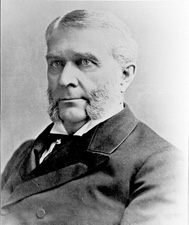William D. Washburn
William Drew Washburn | |
|---|---|
 | |
| United States Senator from Minnesota | |
| In office March 4, 1889 – March 4, 1895 | |
| Preceded by | Dwight M. Sabin |
| Succeeded by | Knute Nelson |
| Member of the U.S. House of Representatives from Minnesota's 4th district | |
| In office March 4, 1883 – March 3, 1885 | |
| Preceded by | District created |
| Succeeded by | John Gilfillan |
| Member of the U.S. House of Representatives from Minnesota's 3rd district | |
| In office March 4, 1879 – March 3, 1883 | |
| Preceded by | Jacob H. Stewart |
| Succeeded by | Horace B. Strait |
| Personal details | |
| Born | January 14, 1831 Livermore, Maine |
| Died | July 29, 1912 (aged 81) Minneapolis, Minnesota |
| Political party | Republican |
| Alma mater | Bowdoin College |
William Drew "W.D." Washburn, Sr. (January 14, 1831 – July 29, 1912) was an American politician. He served in both the United States House of Representatives and the United States Senate as a Republican from Minnesota. Three of his seven brothers became politicians: Elihu B. Washburne, Cadwallader C. Washburn, and Israel Washburn, Jr. He was also cousin of Dorilus Morrison, the first mayor of Minneapolis. He served in the 46th, 47th, 48th, 51st, 52nd, and 53rd congresses.
Washburn was born in Livermore, Maine. A graduate of Bowdoin College, he first studied law in the office of John A. Peters in Bangor, Maine before moving to Minneapolis, Minnesota around 1857.[1] There he practiced law, and worked for the Minneapolis Milling Company (founded by his brother Cadwallader). His business ventures in lumber and flour milling allowed him to amass a large fortune, and by the 1880s, he was among the wealthiest men in Minnesota. Washburn served as the first president from 1883 to 1889 of what was to become Soo Line Railroad.[2] He also founded the Pillsbury-Washburn Milling Company, which later became the Pillsbury Company, and was eventually absorbed by his brother's firm, General Mills.
Washburn built a mansion known as "Fair Oaks" in 1883. It was designed by E. Townsend Mix, who also designed Minneapolis's Metropolitan Building, and the outdoor landscape was laid out by Frederick Law Olmsted. The grounds included an artificial stream leading to a pond, a rustic footbridge, a greenhouse, and a carriage house. The home was demolished in 1924 to make way for a park, although the region is now part of the Washburn-Fair Oaks Mansion District, which was added to the National Register of Historic Places in 1977.
Washburn served in the Minnesota House of Representatives in 1871.[3] He was elected to the United States House of Representatives in 1878 and served from March 4, 1879 to March 3, 1885. He was elected to the Senate in 1888 and served from March 4, 1889 to March 4, 1895.
Washburn was a founder of the First Universalist Church of Minneapolis in 1859. A major benefactor, he served as a trustee and President for much of his remaining life. He died in Minneapolis in 1912. His grandson C. Langhorne Washburn was to be active in the Republican Party from the 1950s through the 1970s.
William Washburn's son, Cadwallader Lincoln Washburn, was born in 1866. Cad became deaf as a child. His talent as an artist was noticed at an early age. Cad eventually became a noted artist and news correspondent who pioneered many new painting techniques in the west. The arts center at his alma mater, Gallaudet University, is named for Cad Washburn.[4] Another son William Drew Washburn, Jr. also served in the Minnesota House of Representatives.[5]
References
- ^ Progressive Men of Minnesota (Minneapolis, 1897), p. 81
- ^ Gjevre, John A. (1990). Saga of the Soo, West from Shoreham (Second ed.). Moorhead, Minnesota: Gjevre Books.
- ^ Minnesota Legislators Past and Present-William Drew Washburn, Sr.
- ^ Gannon, Jack. 1981. Deaf Heritage–A Narrative History of Deaf America, Silver Spring, MD: National Association of the Deaf, p. 147-150 (PDF)(PDF)(PDF)(PDF)
- ^ Minnesota Legislators Past and Present-William Drew Washburn, Jr.
External links
- United States Congress. "William D. Washburn (id: W000175)". Biographical Directory of the United States Congress.
 Media related to William D. Washburn at Wikimedia Commons
Media related to William D. Washburn at Wikimedia Commons
- 1831 births
- 1912 deaths
- Members of the Minnesota House of Representatives
- Members of the United States House of Representatives from Minnesota
- United States senators from Minnesota
- Minnesota Republicans
- Bowdoin College alumni
- People from Livermore, Maine
- Politicians from Bangor, Maine
- 19th-century American railroad executives
- Members of the Universalist Church of America
- Republican Party United States senators
- 19th-century Christian universalists
- 20th-century Christian universalists
- Washburn family
- Soo Line Railroad
- Republican Party members of the United States House of Representatives
- 19th-century American politicians

